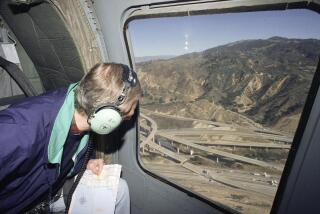Wilson Often Battled INS, Letters Show : Politics: The presidential candidate has targeted illegal immigration. But while a senator he opposed deportation of some workers and fought raids on state firms.
- Share via
SACRAMENTO — When Gov. Pete Wilson officially launched his campaign for the presidency in Manhattan last month, he used the Statue of Liberty as a backdrop, drawing attention to his recent positions condemning illegal immigration.
However, 3,000 pages of correspondence between Wilson and immigration authorities--obtained by The Times under the Freedom of Information Act--provide a somewhat different view of Wilson. In hundreds of letters from his eight years in the U.S. Senate, he frequently battled immigration authorities--sometimes coming to the defense of foreign workers whom authorities wanted deported or excluded from the country.
At other times, he encouraged the immigration commissioner to stop raids on California companies, arguing that sweeping up undocumented workers caused unnecessary disruptions to business.
His critics call his immigration stance an opportunistic change of heart from his Senate years in Washington. But his aides say Wilson has been consistent throughout his long political career--tough on illegal immigration, but also demanding of bureaucrats who don’t follow the intent of the law involving legal entry into the country.
For the most part, the correspondence with the Immigration and Naturalization Service represents the mundane work of a Senate office, scoring points with the folks back home by helping break through bureaucratic barriers.
But amid the many routine requests for help in speeding citizenship papers or obtaining visas for relatives, the documents also include letters from Wilson:
* Defending a cement importing company operated by a Saudi Arabian financier who years later became a fugitive from justice in one of the world’s biggest banking scandals.
* Urging immigration authorities in 1987 to stop requiring employment agencies to check the immigration status of all job applicants or risk heavy fines. Later that year, Wilson collected a $2,000 speaking fee from the group pushing the changes.
* Favoring a cooperative approach in dealing with employers suspected of employing illegal immigrants rather than raids that might disrupt business.
* Repeatedly pushing the Immigration and Naturalization Service to simplify procedures for the entry of foreign farm laborers into the United States under a 1986 amnesty.
* Asking immigration authorities for “appropriate assistance” for three constituents trying to help accused Nazi war criminals who either faced deportation or were seeking to re-enter the United States.
Aides contend that almost all the INS correspondence was handled routinely by staff without Wilson exercising any judgment on the merits of an individual case.
“At no time did Pete Wilson ever advocate or encourage special treatment or access for illegal immigrants,” said Leslie Goodman, the governor’s deputy chief of staff for communications. He did, however, battle at times “to assure swift and efficient implementation of the laws and regulations governing legal immigration.”
Critics, however, accuse Wilson of hypocrisy on the issue of immigration. They point out that Wilson and his former wife apparently hired an undocumented maid 17 years ago. And they fault him for his role in pushing legislation that opened the borders to immigrants under an agricultural worker program that later was troubled by fraud.
The newly released Wilson correspondence with the INS, covering the years 1983 through 1990, is voluminous and not always complete. Immigration officials carefully blacked out the names of most individuals to protect their privacy, sometimes deleting entire pages.
Typical are impassioned pleas for aid from a former Cambodian soldier trying to rescue 11 relatives from the misery of a Thai refugee camp; or from a University of California geneticist hoping to win entry for his new wife, a Czechoslovakian scientist barred because of Communist Party membership.
One Wilson aide familiar with his office’s handling of immigration inquiries said the staff “was instructed not to exercise independent judgment about a constituent claim.” Forwarding letters for response is “a far cry from advocacy,” the aide said.
But sometimes Wilson took a more assertive stand, as when he defended Falcon Pacific Cement Inc., which brought the vessel Muscat Cement and its mostly Filipino crew to the Port of Los Angeles in 1986. The INS raided the ship and eventually deported most of the crew.
Wilson’s letter argued that the crew’s visas entitled them to work aboard the vessel, with its automated equipment for loading and unloading cement. However, immigration authorities concluded that the ship’s crew members were illegally displacing U.S. workers.
Wilson in his letter complained that the government action “seriously impaired the ability of Falcon Pacific to conduct its business. . . .”
The company was a subsidiary of InterRedec Inc., which was owned by Ghaith Pharaon. In 1991, Pharaon was indicted on federal racketeering charges after the collapse of the Bank of Credit & Commerce International. He remains a fugitive.
Robina Rich, who headed the cement company at the time, described it as “a perfectly normal cement enterprise,” unrelated to the later banking scandal.
The company approached Wilson for his help, she said, because of the political trouble generated by the unions.
Wilson’s letter was copied to Ernest McGuire, a Corona-based builder who had a $600,000 contract to construct cement-loading equipment for the ship.
McGuire said it was a coincidence that two weeks after the letter, he and his wife contributed $1,750 to Wilson’s reelection campaign.
Wilson also came to the defense of employment agencies, which were required under the 1986 immigration reforms to check the immigration status of all job applicants they processed or risk heavy fines. In 1987, Wilson argued that INS rules for implementing the new law would bring “an extraordinary economic burden on personnel placement firms.” Faced with numerous complaints from Congress, then-Immigration Commissioner Alan C. Nelson backed off.
Several months later, Wilson was the featured speaker at a meeting of the National Assn. of Personnel Consultants, which organized the protest--for which he received a $2,000 honorarium, according to Senate records.
Wilson spokeswoman Goodman said that any suggestion that Wilson “may have been influenced by contributions or honoraria is outrageous and false.”
In other letters to immigration officials, Wilson was critical of INS raids that resulted in the arrests and deportation of undocumented workers. In 1988, Wilson wrote the INS commissioner a congratulatory letter for working out a cooperative agreement with B.P. John Furniture Co. of Santa Ana--the largest West Coast furniture manufacturer at the time.
The firm, no longer in business, was the target of repeated INS sweeps, leading to hundreds of deportations. The former owner of the firm, Ben Bukewihge, said recently that he “had documented records of every single employee” and was never fined by the INS.
Throughout his Senate career, Wilson worked to ease the entry of foreign farm workers into the U.S. “for perishable agriculture to ensure a continued labor supply,” as he wrote INS Commissioner Nelson in 1988. Two years before, Wilson threatened a filibuster if an agricultural guest worker program were not included in the final immigration reforms, which eventually allowed about 1.3 million undocumented workers to become permanent residents.
In 1987, he and three of his Senate colleagues wrote Nelson that the procedures set up at the border with Mexico “have led to a decrease in the number of undocumented and illegal aliens. However, these same procedures have proven to be so cumbersome and confusing that there has been a sharp drop in the number of available migrant workers.”
Wilson collected $744,188 from agricultural interests for his Senate campaigns.
“On even days, [then-Sen.] Wilson would say too many people were coming across the border illegally,” said California Democratic Party consultant Bob Mulholland. “On odd days, he would push legislation to bring them in by the pickup truck, with a piece of paper.”
In 1986 and in 1987, Wilson asked federal officials to review a request to allow the return to the United States of Arthur Rudolph, a German-born space official who managed the Saturn V rocket program that took American astronauts to the moon. In 1984, Rudolph returned to Germany and gave up his U.S. citizenship amid charges that he deployed slave labor and permitted abuse of prisoners at Mittelwerk, a subterranean German rocket plant.
Rudolph’s supporters contended that the rocket maker left the United States under duress and should be allowed to return.
Wilson’s office wrote similar letters in the cases of Martin Bartesch, once a guard at the Nazi concentration camp at Mauthausen in Austria, and Josef Eckert, a guard at Auschwitz.
Bartesch’s son, Heinz, a Northern California businessman, recalled that his father, who was dying from cancer, got little sympathy from other California politicians.
A Wilson adviser said that “there was absolutely no advocacy” for the accused war criminals and that Wilson took a tough stand in dealing with former Nazis. Wilson took the lead in the Senate, the adviser said, in urging the government to bar former United Nations Secretary General Kurt Waldheim from the United States because of his role in the persecution of Jews and others during World War II.
Said Neal M. Sher, the former director of the Justice Department’s Office of Special Investigations, who initiated all three deportation cases: “What Wilson’s office did, I consider that very, very routine. . . . I always considered Wilson to be supportive of our work.”
Times staff writer Dwight Morris in Washington contributed to this story.
More to Read
Get the L.A. Times Politics newsletter
Deeply reported insights into legislation, politics and policy from Sacramento, Washington and beyond. In your inbox twice per week.
You may occasionally receive promotional content from the Los Angeles Times.










